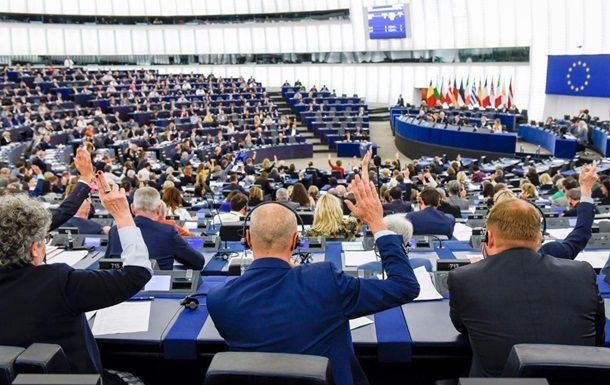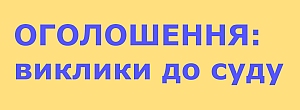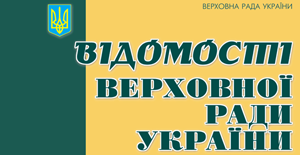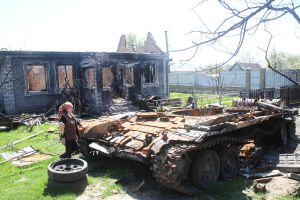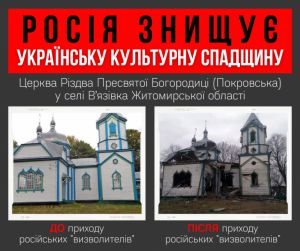On December 16, deputies of the European Parliament gave the overwhelming support for a resolution on the situation on Ukrainian borders. The resolution calls for the European Union to be prepared to impose severe sanctions against Russia in the event of further escalation.
Voting in favor of the resolution were 548 deputies, 69 voted against and 54 abstained.
The text of the resolution in part reads, “The EU must be ready to send Russia a stark warning that military hostilities against Ukraine will not only be unacceptable, but would also come at a high economic and political price.”
The document also says, “EU countries must remain ready to agree swiftly on severe economic and financial sanctions against the Russian government to address immediate threats, rather than wait for another invasion to take place before taking action.”
MEPs maintain that in case of new escalation against Ukraine sanctions should include the Russian officer corps and flag officers involved in the planning of a possible invasion as well as the immediate circle and oligarchs “in the orbit of the Russian President and their families”.
Apart from that, the resolution proposes the exclusion of Russia from the SWIFT payment system, the targeting of sectors important to the Russian economy and the disruption of the financing of the country’s intelligence services and the military.
Members of the European Parliament also demand that the European Union take credible steps to reduce its dependence on Russian energy imports and refrain from putting into operation the Nord Stream-2 project.
President Volodymyr Zelenskyy of Ukraine welcomed the resolution approved by the European Parliament. “Russia will pay a high economic and political price for military aggression against Ukraine,” he said and added that a threat to Ukraine’s security is a threat to peace and stability in Europe.
For his part, Foreign Minister of Ukraine Dmytro Kuleba had this to say, “The European Parliament stresses in clear terms that the Russian Federation must withdraw its troops from our borders and stop creating more threats to our country’s territorial integrity. It is very important for us that the resolution of the European Parliament reaffirms Ukraine’s prospect for joining the European Union.”
That same day, December 16, the leaders of the countries-members of the European Union at the summit in Brussels made a unanimous decision to extend economic sanctions against Russia for another six months.
At a press conference after the summit meeting, European Council President Charles Michel said, “EUCO leaders unanimously agreed to roll over economic sanctions against Russia. We call on Russia to keep its part of the bargain and proceed with Minsk implementation.” The high-ranking European official added, “Massive consequences and severe cost will follow if Russia takes further military action against Ukraine.”
Before the bloc’s leaders passed their judgement at the summit, Volodymyr Zelenskyy called on the West to introduce preventive sanctions against Russia without waiting for further escalation in Donbas. He stressed, “The sanctions policy against Moscow ‘after’ no one is interested in.”
According to Western observers, such “cautious” position of the bloc’s leaders unlike that of MEPs may be explained by the fact that the leading European countries Germany, France, Italy and Spain insist on a dialog with the Russian authorities before launching painful economic measures.
Thus they say that the present-day Europe is divided into those countries (on its eastern border) who demand the introduction of sanctions without delay and those countries such as France and Germany which believe that the additional severe sanctions will only provoke Moscow for new aggressive actions.
On December 16, the North Atlantic Council, the highest political body of the Alliance that adopts decisions, made a statement about the situation in and around Ukraine, “We are gravely concerned by the substantial, unprovoked, and unjustified Russian military build-up on the borders of Ukraine in recent months, and reject the false Russian claims of Ukrainian and NATO provocations. We call on Russia to immediately de-escalate, pursue diplomatic channels, and abide by its international commitments on transparency of military activities.”
The Council of the Alliance also stressed that “any further aggression against Ukraine would have massive consequences and would carry a high price.”
The Alliance’s statement underscores, “We reiterate our support for the territorial integrity and sovereignty of Ukraine within its internationally recognised borders, and call on Russia to withdraw its forces from Ukraine in accordance with its international obligations and commitments. We support the right of all countries to decide their own future and foreign policy free from outside interference. NATO’s relationship with Ukraine is a matter only for Ukraine and the 30 NATO Allies. We firmly reject any attempts to divide Allied security.”
The newspaper Voice of Ukraine


